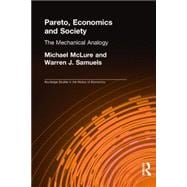
Note: Supplemental materials are not guaranteed with Rental or Used book purchases.
Purchase Benefits
What is included with this book?
| List of illustrations | p. x |
| Foreword | p. xi |
| Preface | p. xiv |
| Acknowledgements | p. xvii |
| Introduction | p. 1 |
| The purpose of the study | p. 1 |
| Central thesis and research goals | p. 2 |
| The contribution of the study | p. 5 |
| Economic approaches to Paretian studies | p. 7 |
| The structure of this research | p. 10 |
| Conclusion | p. 15 |
| Pure economic studies of Pareto's work | p. 15 |
| Socio-economic studies of Pareto's work | p. 17 |
| Sociological/political studies of Pareto's work | p. 18 |
| Methodology | p. 20 |
| Introduction | p. 20 |
| Methodological lessons from the physical sciences | p. 21 |
| Scientific propositions about social phenomena | p. 27 |
| The study of non-logical conduct | p. 28 |
| Some critical assessments | p. 32 |
| Conclusion | p. 38 |
| Method: the analytical elements of pure economics and general sociology | p. 40 |
| Introduction | p. 40 |
| Pure economics: the evolution of homo oeconomicus | p. 40 |
| General sociology: elites, residues, derivations, interests | p. 50 |
| The rapport between pure economics and general sociology | p. 58 |
| Rational fools in relation to logical and non-logical conduct | p. 61 |
| Economic policy: logical and non-logical conduct | p. 63 |
| Conclusion | p. 64 |
| Determinism, ideology and the mechanical analogy | p. 67 |
| Introduction | p. 67 |
| The mechanical analogy and Laplacian determinism | p. 68 |
| Mirowski's critique of Pareto on exchange theory | p. 71 |
| The mechanical analogy in the Cours | p. 73 |
| Integrating the mechanical analogy with the economic 'fact of choice' | p. 76 |
| Dobb: the cause of value in general equilibrium systems | p. 78 |
| Conclusion | p. 87 |
| Mirowski (1989): the conservation of energy and the neoclassical theory of value | p. 87 |
| Mirowski (1989): comments on Pareto and the integrability problem | p. 90 |
| Collective economic welfare | p. 91 |
| Introduction | p. 91 |
| "Il Massimo di Utilita dato dalla Libera Concorrenza" and the Cours | p. 93 |
| The Scorza/Pareto polemic (I): sociology of knowledge | p. 98 |
| The Scorza/Pareto polemic (II): economic maximum and methodology | p. 101 |
| The Scorza/Pareto polemic (III): Chipman's final comments | p. 107 |
| Scorza's influence on the 1906 Manuale/1909 Manuel | p. 110 |
| Conclusion | p. 113 |
| Equations related to collective economic welfare | p. 114 |
| Les Systemes Socialistes and Buchanan's constitutive elements of economic policy | p. 119 |
| Introduction | p. 119 |
| Sentiment and socialist systems | p. 120 |
| Romance and democracy | p. 123 |
| Methodological individualism | p. 124 |
| Homo oeconomicus | p. 125 |
| Politics-as-exchange or politics-as-power? | p. 130 |
| Normative issues: rules, outcomes and social selection | p. 133 |
| Conclusion | p. 137 |
| Rationality, individualism and public policy | p. 139 |
| Introduction | p. 139 |
| Irreducibly social goods | p. 140 |
| Rational and irrational behaviour | p. 143 |
| Preference manipulation and non-logical actions | p. 147 |
| Preference differentiation by type and institution | p. 152 |
| Conclusion | p. 153 |
| Government and public policy | p. 155 |
| Introduction | p. 155 |
| Contextual information | p. 156 |
| Personal utility, expected social utility and 'government' | p. 163 |
| Public policy | p. 172 |
| Conclusion | p. 175 |
| Preference types, personal utility and expected social utility | p. 176 |
| Conclusion | p. 179 |
| General finding | p. 179 |
| Findings related to the goals of the study | p. 179 |
| Future research | p. 185 |
| Pareto's major publications | p. 187 |
| Notes | p. 194 |
| Bibliography | p. 206 |
| Index | p. 219 |
| Table of Contents provided by Syndetics. All Rights Reserved. |
The New copy of this book will include any supplemental materials advertised. Please check the title of the book to determine if it should include any access cards, study guides, lab manuals, CDs, etc.
The Used, Rental and eBook copies of this book are not guaranteed to include any supplemental materials. Typically, only the book itself is included. This is true even if the title states it includes any access cards, study guides, lab manuals, CDs, etc.